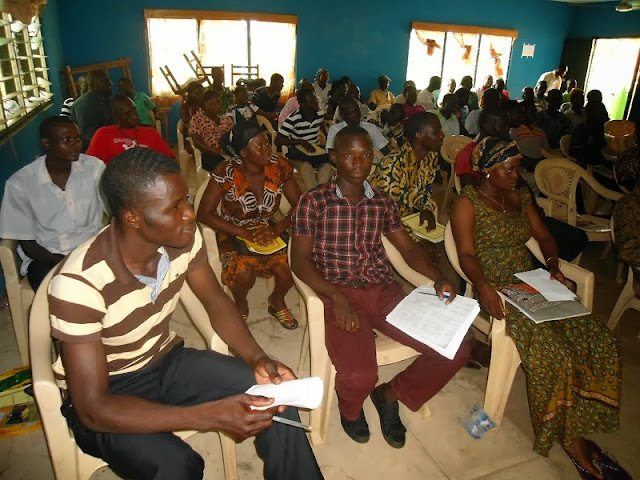By Abdulai Imoro, EQUIP Project Coordinator, School for Life
The EQUIP Programme seeks to improve the quality of
education in selected schools in Northern Region. The program is aimed at improving learning
outcomes in schools; cultivating reading habits in children; promoting
independent learning; and building confidence in teachers though the following
interventions:
·
Training of selected teachers in learner-
centered, mother – tongue, gender sensitive teaching, and the creation of
teaching and learning materials from local sources and teaching of reading and
writing skills
·
Training of head teachers in aspects of school
management
·
Training of Ghana Education Service school
supervisors to perform their roles more effectively
·
Provision of materials of various sorts to the
schools to promote the culture of reading among children
·
Conducting competitions and assessments to test
performance and achievements
·
Organize orientation workshop for SMC/PTA
Executive members on their roles
The project seeks to integrate solutions to the inhibitors
and shortcomings that prevent the achievement of quality education in rural
primary schools, building on solutions that have been tried and proven but have
not been previously brought together in a single programme. In order for EQUIP
to be able to give the treatment above to beneficiary schools, the following
strategies are used:
·
Phonic/syllabic approach
·
Use of games to teach both Literacy and Numeracy
·
Child- centered approach
·
Word problems to teach numeracy
·
Use of songs and rhymes in teaching both
Literacy and Numeracy
·
Use of relevant teaching and learning materials
to explain basic concepts.
The School for Life/Tzedek EQUIP programme started as a
pilot project in Saboba and Cheriponi Districts. During the pilot, Ten schools
were chosen as EQUIP schools in each of the pilot Districts. After the pilot,
the project extended its coverage to include two new districts; i.e. Savelugu
District and Kumbungu District were added to the beneficiary districts of
EQUIP.
Whiles the project extended its coverage by adding more
districts, it increased the number of beneficiary schools in each of the
existing districts. Thus, the number of beneficiary schools was increased from
ten during the pilot to twenty new schools, in the existing districts. In all,
twenty new schools were added in each of Saboba and Cheriponi districts when it
extended its coverage to new districts.
EQUIP is a Comic Relief funded project which seeks to
complement the efforts of the Government in collaboration with the Ghana
Education Service (GES), School for Life, and the Cheriponi, Saboba, Savelugu
and Kumbungu District Assemblies. The
key stakeholders/partners of EQUIP include; The Ghana Education Directorates of
beneficiary districts, District Assemblies of Beneficiary districts, heads of
schools, SMC/PTA, teachers as well as pupils.
Whiles the above institutions/personalities are partnering, School for
Life is an Implementing partner of Tzedek, which initiates policies/programs
with partners and implements the projects on the ground.
The School for Life/Tzedek EQUIP is implemented by Project
Staff made up of four (4) District Coordinators, a Project Coordinator and
Project Manager. All district coordinators report to the Project Coordinator
who in turn reports to the Project Manager. The Management of School for Life,
exercises oversight responsibility over all EQUIP project staff.
In order to determine the success of the programme,
baseline, mid-line and end-line studies will be conducted, which will include
comparisons to other approaches; e.g. teacher training, learning outcomes by
learners in a control group which receives no quality education strategies. Within these approaches, several elements
will be tested. There will be six elements including;
·
Pupils’ phonic knowledge
·
Pupils’ alphabetic knowledge
·
Pupils ability to read simple text
·
Pupils’ ability to read and comprehend
·
Pupils ability to recognize numbers
·
Pupils’ ability to do simple calculations
Results of these evaluations will be incorporated into
future programme development efforts.
Teachers participating in teacher training sessions
Teacher delivers findings from group discussions to the class
Group work encourages participation









